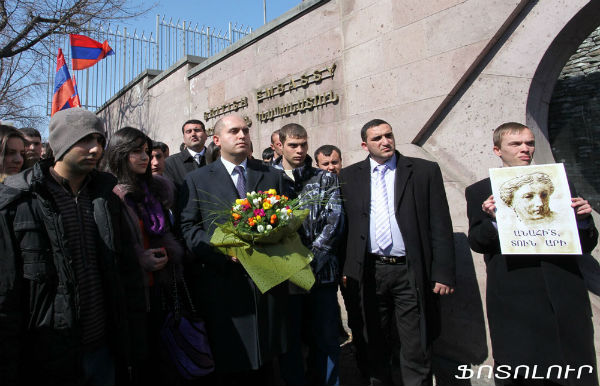
March 8 has spread its strong and very long roots around all of us. The holiday (International Women’s Day), spring, beauty, gifts, as well as promises of smiles (women’s) and happiness (also women’s) are in the air — turning into a hybrid of floral bouquets and weapons.
The floral bouquet is wrapped in plastic, while the weapon is applied mainly in the news flashing across the screen, special broadcasts and in free and paid demo rallies.
Actually, all floral bouquets are weapons (at least biological), and when applied more broadly (say, 10 bouquets daily) the culture of giving flowers becomes a tool. And the trick of this quite ambiguous tool that possesses a sexual orientation puts our state-serving television hard at work.
On Mar. 8, remarks will abound, gifts will be distributed and masterpieces of the mind will be heard on all the TV channels. The key players are going to be politicians, businessmen/benefactors, and low-, medium- and high-ranking state officials. All will “glorify” women and in an official capacity and publicly (on air) will bestow floral bouquets (in decorated polyethylene wrapping and synthetic ribbons).
Specially on this day, female artists’ exhibits will open, the army of female teachers (coiffured and wearing make-up specially for the occasion) will visit an event hall (say the municipality’s auditorium) to receive gifts, and then female state ministers (there are two) will speak about the mission of being a woman — and their words will be picked up by female members of parliament. And so, women will become armed in the task of keeping Mar. 8 duly at the center of attention. There will be floral bouquets in the pavilions of all the channels, which will become the symbol of the holiday.
March 8 is the international day of women’s struggle — at least this is how those who defend women’s rights (which, by the way, are not only women) have described it to the world. Later, the methods of struggle changed, and many countries refused to mark this day as a calendar holiday. The Republic of Armenia likewise refused but later realized that to miss this chance would be an unforgivable oversight. After all, doesn’t a holiday mean gifts, and when you speak of gifts you are saying that the giving of gifts is an emotional task? And so, lock up your intellect and strain your emotions. Turning emotions into smiles, beautiful clothes, and a festive mood (in short, a weapon) is also desirable.
Do you agree that gifts and struggles are opposing things? Well, you won’t fight to get more, better-quality gifts, right? No, you will accept the gift obediently, and if you don’t need it, you’ll put it aside — without forgetting to say thank you.
The practice of giving and receiving gifts (and that on a mass scale) slowly acclimatizes us to the idea that a gift can be in the form of not only a perfume, chocolates, a floral bouquet, but also a park, a sculpture, a performance, or a food basket. The psychology of the gift receiver is very different than the psychology of the earner. And it is this difference that our officials constantly put on display, who by giving gifts become princes, while by creating opportunities to earn, they become servants.
Also not wanting to remain a servant is Armenia’s education minister, who is giving a majestic gift to Armenia. The name of the gift is “Anahit, come home” (referring to the Armenian Goddess Anahit statue, the fragments of which are at the British Museum. Local activists have been fighting to have the statue returned to Armenia). In any case, it is with floral bouquets and posters bearing such an inscription that the delegation led by the education minister went to the UK Embassy in Yerevan wanting to return the head and hand of the bronze statue to Armenia.
A gift is a good thing, but from the start (say when it is considered an official day of gifts) the meaning of the gifted object loses its value — and so, you can no longer say it was a thing that was negligible, anachronistic or devoid of meaning. A gift is really a weapon. A very felicitous weapon, which is used against women on Mar. 8.
Nune Hakhverdyan
P.S. There’s an amazing young woman in Armenia who everyone knows about — local environmental activist Mariam Sukhudyan, who posted this message on a social networking site: “We’re not naive children, asking Santa Clause to realize our dreams. We are neither capricious women, asking men to give us the park as a gift. We are self-determined citizens of Armenia, who are demanding the relevant bodies to respect the law and not display voluntarism toward our rights inscribed in law.”
The views expressed in the column are those of the author's and do not necessarily reflect the views of Media.am.


Add new comment
Comments by Media.am readers become public after moderation. We urge our readers not to leave anonymous comments. It’s always nice to know with whom one is speaking.
We do not publish comments that contain profanities, non-normative lexicon, personal attacks or threats. We do not publish comments that spread hate.